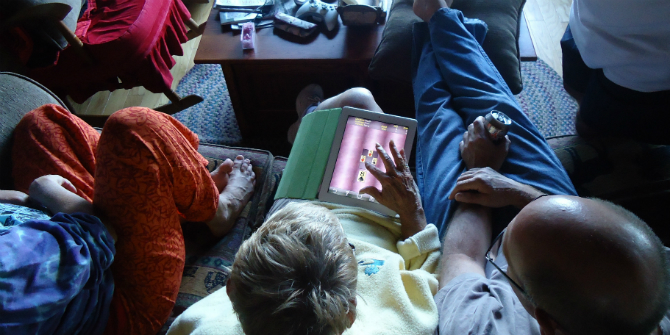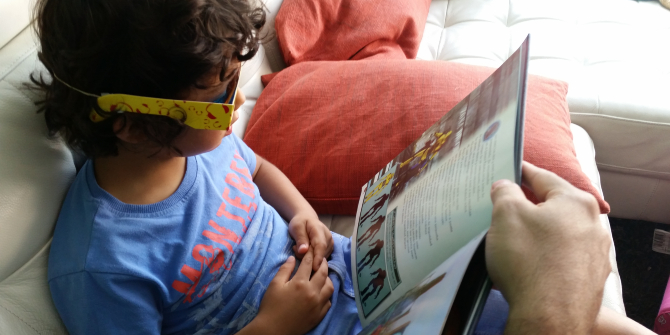 Digital media has added a layer of complexity to parenting: parents are managing multiple media environments for themselves and their children amidst relentless connectivity. This can result in parents worrying about how they and their children use digital media, and how their family interactions may be affected. Kerri Bleeker, a recent graduate of the MSc in Social and Cultural Psychology at LSE, talks about her research findings highlighting that digital behaviour is the new generation-gap challenging parents and that parents can feel disenfranchised when they rely on digital media as a de facto co-parent.
Digital media has added a layer of complexity to parenting: parents are managing multiple media environments for themselves and their children amidst relentless connectivity. This can result in parents worrying about how they and their children use digital media, and how their family interactions may be affected. Kerri Bleeker, a recent graduate of the MSc in Social and Cultural Psychology at LSE, talks about her research findings highlighting that digital behaviour is the new generation-gap challenging parents and that parents can feel disenfranchised when they rely on digital media as a de facto co-parent.
Children see their parents on different devices in a range of scenarios, so inevitably parents become digital role models to their children. My own challenges as a mother to a young child made me consider how the pervasive nature and technological capabilities of digital media might be impacting parents and their children. My research explored the perceptions and practices of parents with young children (aged 5 and under) on their digital media use and that of their children. I conducted 24 semi-structured qualitative interviews, speaking to 42 UK parents. My research also investigated whether demographic variables (such as age, gender, education) or parental attitudes towards digital media use, technology, sharing practices and privacy significantly contribute to how much digital media parents and their children consume. This quantitative study consisted of secondary analyses of the “Parenting for a Digital Future” survey data set kindly shared by Professor Sonia Livingstone in the Department of Media and Communications at LSE. From the nationally representative sample of 2032 UK parents of children aged 0-17, my study consisted of 355 parents of children aged 5 and under.
What did I learn?
My research highlighted that parents are very concerned about the role that digital media plays in family life. Parents are conflicted about their own relationship with digital media, as well as that of their children. Whilst digital media can facilitate, it can also disable the lives of parents. Furthermore, although parents are concerned about how digital media may be having an impact on their children’s development, they also see it as a necessary part of their children’s lives, a part that provides real benefits.
Using digital media as a parenting tool to entertain, distract or comfort children can contribute to “disenfranchised” parenting. This occurs when parents increasingly rely on digital media as a de facto co-parent. In this situation, parents report that they can become lazy, unimaginative, selfish or distracted, ultimately, taking them away from their children. They are also concerned about their children’s exposure: both in terms of time (too much) and content (inappropriate).
“I think it makes you lazier because when our son was younger and he came into our bed in the morning, we just gave him the iPad and we’d go back to sleep and he’d sit in bed and watch it”
Most parents think that they are questionable media role models. Whist some parents feel guilty about this (“There’s been more than one occasion when my son has asked me to put my phone away which isn’t great”), others accept that this is the new landscape (“Kids are always going to see their parents or someone on the phone”). The majority admitted that they do use various devices in front of their children. Media use can become an issue if children feel they are competing for their parent’s attention.
These parents did not grow up in the same digital media landscape as their children, so a ‘mismatch’ occurs where parents do not have their own lived experience or parenting “blueprint” to draw from.
“I’m worried I won’t have a clue how to guide my son through the technological maze”
These parents have coping strategies such as managing content and exposure, “unplugged” play, self-education, protecting privacy and parental controls to mitigate concerns around their children’s digital media use (“There’s three levels of encryption on it. I try and think through quite carefully how we keep our daughter safe”). They also recognise that a balanced approach – not an outright ban – seems most sensible to achieving digital “harmony”.
“I think it’ll be great for them to be able to enhance their skills themselves [using a smart device] but balanced with activities like outdoor play to develop imagination and creativity”.
All parents accept that their children’s world is and will be technological (“The reality is that the internet is a way of life. As soon as they go to school, they’ll be on it”). Most parents want their children to be familiar with technology and media literate to be prepared for the future. However, there are concerns around inappropriate content, over-exposure and the potential long-term effects on child development.
Analysis of the quantitative data showed that there is a digital divide amongst parents that influences how they and their children consume digital media:
- The more educated the parents, the more they use digital media as they are likely to have more personal and professional experience with digital media.
- The more positive parents’ views on digital media use are, the greater their child’s digital media use. One manifestation of this is the practice of sharing photos online; the more parents share images, the more digital media their child consumes.
- Parents from higher income families use more devices than those from lower income families.
- The more positive parental views on digital media use are, the more devices the family tends to have.
- The more parents use digital media, the more devices a family has.
Conclusion
If digital media is taking parents away from their children and affecting parent-child interactions, parents have a responsibility to their children to be good media role models. The adage “do what I say, not what I do” is pertinent in this context. Children will imitate parents’ behaviour, despite obeying (or disobeying) their instructions. This research does not recommend that parents should never be on their devices in front of their children. Instead, balancing their own needs with those of their children can help parents model “good” media behaviour. Parent co-viewing can be helpful in this regard. However, giving your child just 10 minutes of uninterrupted (by devices) and undivided attention communicates just how important they are.
This research raises the question as to whether it is ironically the most sophisticated and educated digital media users that might actually be modeling the worst type of digital behaviour. Investigating a possible inverse “digital divide” is an area for further research. Mass-market, mobile computing is only 11 years old. Children who started using iPhones at 2-3 years old are 13-14 today. Not enough time has elapsed to understand the long-term effects of newer types of digital media use on child development. This, combined with the lack of concrete evidence, enables myths and media scaremongering. As the digital media landscape evolves, further research will only become more pressing.
This post gives the views of the authors and does not represent the position of the LSE Parenting for a Digital Future blog, nor of the London School of Economics and Political Science.
Featured image: photo by Kelly Sikkema on Unsplash





